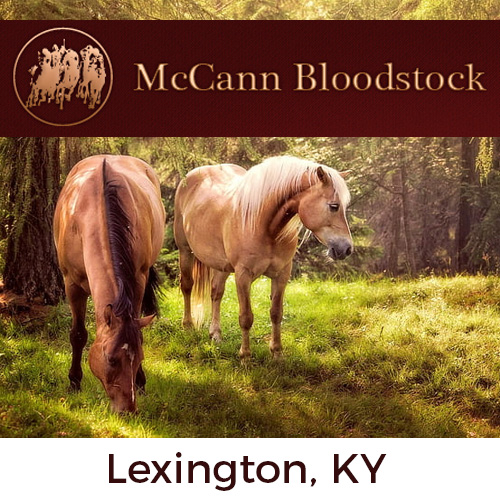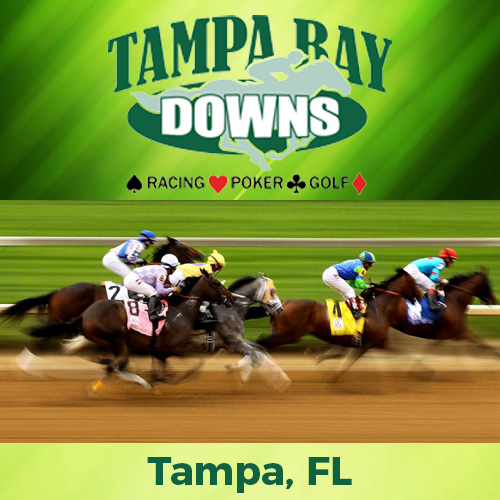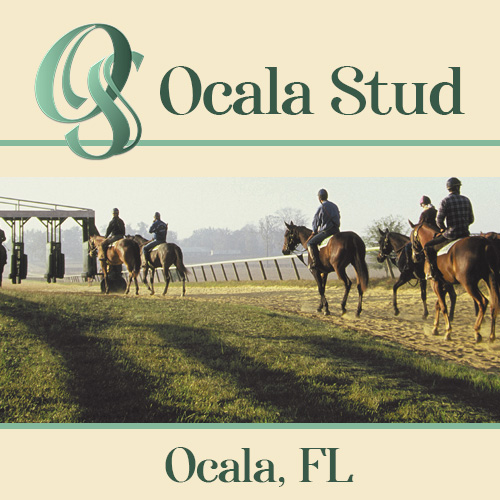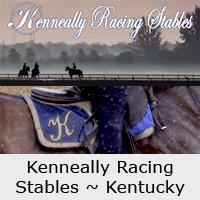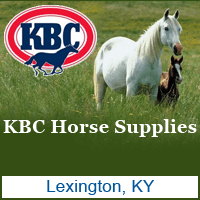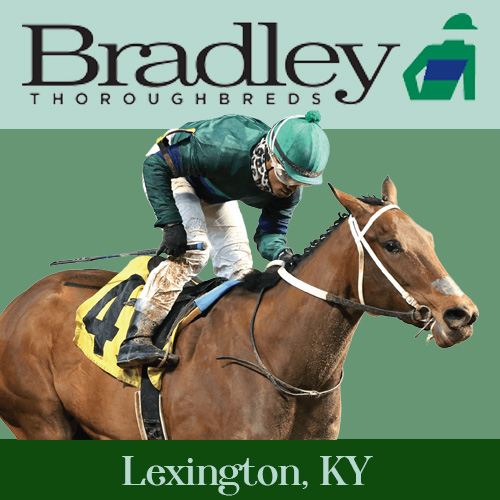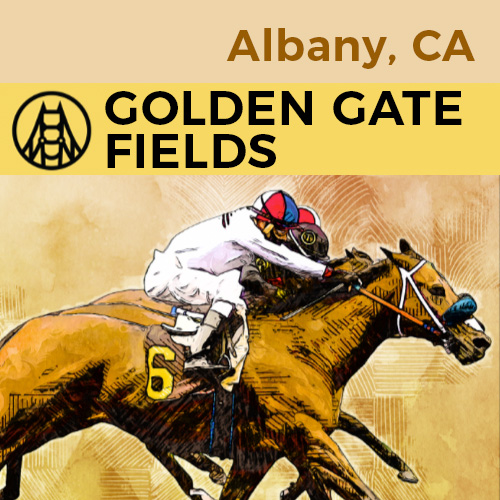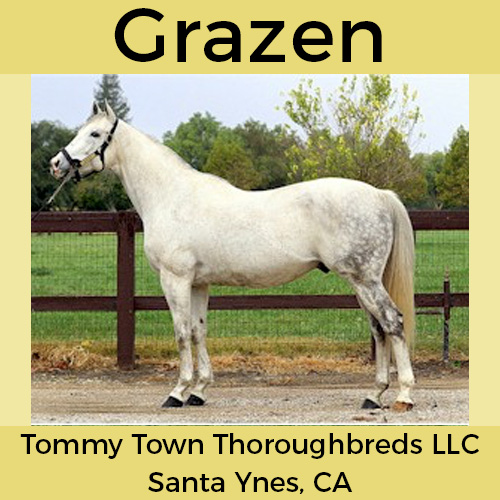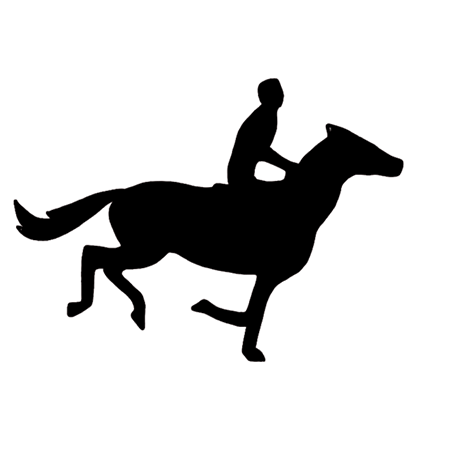The Interviews: Renowned California Race Caller Michael Wrona
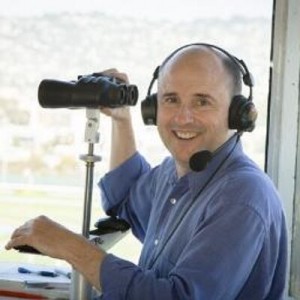 TBP: Where were you born and raised?
TBP: Where were you born and raised?
MW: Brisbane, Australia. I have family down there and some family in Sydney too. I’ve actually seen more of the US than I have of Australia, having been here since I was 24.
TBP: What are the big racetracks in Brisbane?
MW: There are two main metropolitan tracks, Eagle Farm and Doomben, which are across the street from each other, and there are a whole host of smaller tracks within the remaining area.
TBP: How did you become interested in race calling?
Radio broadcasting of racing is very big in Australia. I had a lot of exposure to listening to race calls, it interested me and I found myself mimicking the callers and wanting to emulate them.
My grandfather gave me a horse racing game called “The Melbourne Cup”, I still remember the ten plastic horses, rolling the dice and betting the false money, but I derived the most enjoyment from calling out the horses’ names as we pushed them around the board. I decided the dice were holding me back so the next thing I did was to make paper cutouts of the horses’ silks of that era, each one measuring about an inch to an inch and a half. I accumulated about a thousand of them, grouped them into categories for different types of races and distances and would push them across the floor shouting the call at the top of my lungs into a tape recorder. It probably drove the neighbors crazy. I was set on becoming a race caller.
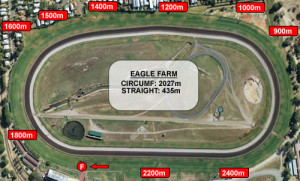 TBP: So how did you go about getting into the business?
TBP: So how did you go about getting into the business?
MW: I wrote a couple of letters to established race callers in Brisbane and they invited me out to Eagle Farm and Doomben to meet them. They sometimes had a spare booth up in the grandstand and they would let me practice calling races into a tape recorder.
When I was 17 I got my first chance to call a public race live over the public address system at a track about an hour and a half outside of Brisbane on the provincial circuit, a place called Kilcoy. It was April of 1983. It must have gone reasonably well because I was asked to call the following race as well.
I had left high school and was working at a bank when the first opportunity to call a full card came a couple of months later. It was the most humble and basic of beginnings, it was way out in the middle of Australia in the outback at a track called Brunette Downs in the Northern Territory. People would converge from hundreds of miles around for this annual weekend of racing. The horses were a mix of thoroughbred and quarter horses. It was on a dirt track, which was unusual in Australia, it was bigger than US tracks though with no outside rail. The journey involved a flight in a normal commercial airliner, then the last leg was in a three seater plane for a couple of hours. The opportunity came my way because the original caller couldn’t do it and the next choice didn’t want it because they didn’t like flying in small planes. I didn’t even have a tent to sleep in when I got there, I slept at a cattle ranch under the stars.
 I had to take a couple of sick days off my bank job to go up there and a few eyebrows were raised when I got back with my tan…. Over the next couple of years I got more part time opportunities at the tracks around Brisbane, and then an opportunity came up to go and work at the radio station that was dedicated to horse racing. It was mainly a behind the scenes job but it was a foot in the door, I started to get rostered on to call some greyhound and harness racing as well as the odd thoroughbred race, on Saturdays I’d be at the main racetrack assisting the team.
I had to take a couple of sick days off my bank job to go up there and a few eyebrows were raised when I got back with my tan…. Over the next couple of years I got more part time opportunities at the tracks around Brisbane, and then an opportunity came up to go and work at the radio station that was dedicated to horse racing. It was mainly a behind the scenes job but it was a foot in the door, I started to get rostered on to call some greyhound and harness racing as well as the odd thoroughbred race, on Saturdays I’d be at the main racetrack assisting the team.
Then out of the blue came a life changing phone call from the race caller who I had most idolized growing up, the main race caller in Sydney, Johnny Tapp. He was offered the job at Hollywood Park in 1990 which he declined. He did bring his family over for a working vacation and called for three weeks, but by his own admission he felt he was a bit long in the tooth to make a move of that magnitude, so when they asked him if he could suggest anybody else he recommended me. I didn’t realize he was even aware of me! So arrangements were made and I came over to California in the Spring of 1990. I’ll never forget the first call I made at Hollywood Park, as I was calling them past the finish line Tappy was slapping me on the back.
One of my favorite memories of that first meet when I came over in 1990 was a classic renewal of the Hollywood Gold Cup with the great reigning horse of the year in Sunday Silence meeting Criminal Type, who would become the horse of that year. They were stride for stride in the last three eighths of a mile, Criminal Type won by a nose and I thought to myself that it was a long way from Brunette Downs and Kilcoy and the other places I used to knock around, so that was a very memorable race.
There was some pressure at the time to not call close finishes, but I stuck my neck out and fortunately got it right. I like to make the photo call if I have a strong feeling about it. If you know the angle and the horses are in stride you can be more confident about it, it’s when they are out of stride that it’s usually better to stay out of it.
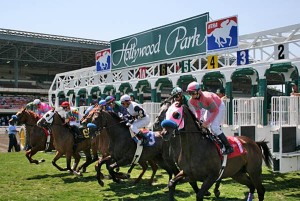 TBP: How did that first experience work out?
TBP: How did that first experience work out?
MW: Within a year my Hollywood Park tenure was sadly over, I had the rug pulled from under my feet as there was a big upheaval and controversy over the ouster of Marge Everett, who was the lady who brought Johnny Tapp and myself over. It was a very bad, nasty, proxy fight. Fortunately I was contacted by Bay Meadows so I came up to Northern California. Then Golden Gate expressed an interest and for a while I had the Northern California circuit to myself.
Then in 1993 a similar thing happened at Bay Meadows to what had happened at Hollywood Park. I had never imagined that politics could reach the person in the booth on the roof and I found myself looking for another track, as Golden Gate by itself wasn’t really enough.
I went to Retama Park in San Antonio to call their inaugural season in ‘95 for a spell and then I was contacted by Arlington Park and I went there for two years, where I had the chance to call Cigar’s record breaking win for consecutive wins when he won the Arlington Citation Challenge. Arlington was a beautiful, opulent track and then the owner closed it down.
I went back to Hollywood Park and Turf Paradise was a part of that deal too. Then I went to Lone Star Park for five years, working concurrently at Fair Grounds in Louisiana.
TBP: How are race callers hired and paid?
MW: It’s normally a per diem contractor arrangement and is seasonal of course. I don’t get paid if I am not working unfortunately.
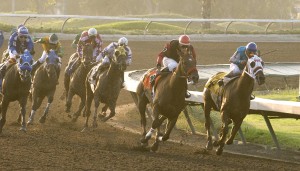 TBP: How was your spell at Los Alamitos this past July?
TBP: How was your spell at Los Alamitos this past July?
MW: Los Alamitos was very enjoyable and very challenging because of the configuration of the track and the different angles compared to a track like Golden Gate. It has the longest home stretch in the country and they angled the backstretch differently to other tracks. There are some challenges with glare from the sun in the late afternoon too, but it keeps you on your toes and it’s nice to get yourself out of your comfort zone. It was also very nice to get reacquainted with Southern California.
TBP: What is your process as a caller to memorize colors and recognize horses?
MW: The focus is the jockey’s colors. It is helpful to have the colored saddle cloths too but you are taking a big risk if you rely on them alone because if you get a horse directly outside another in a bunched field you might just get a flash of the jockey’s cap and the saddlecloth can be totally obscured, so I always make myself learn the jockey’s colors. The equipment can also help, different color bridles and shadow rolls etc.. I repeat each horses name many times in the post parade as I watch them.
TBP: For me a great race caller calls the race in a very informative way as if it is for people who cannot see the race, which is your style in my opinion, as opposed to some callers whose style revolves around the idea that they are calling the race to people who are watching it with them.
MW: Well my style is really the old school Australian style because it was done mostly for radio, using that descriptive nature for an audience who cannot see the race, so that’s what I do.
 TBP: You are also known for the odd humorous quip, but in my experience when you do that it never comes at the expense of the call.
TBP: You are also known for the odd humorous quip, but in my experience when you do that it never comes at the expense of the call.
MW: Well thank you, I never want to be branded as a comedian and the accuracy of the call is paramount. Occasionally if a call can be embellished and give people a chuckle then why not, as long as you always keep the priorities straight.
TBP: How is racing different in Australia to here in the US?
MW: Horse racing is much more part of the general sporting culture in Australia, there is a vast network of betting shops, they are always around the malls and these days there are betting terminals in the pubs, bars and clubs. People have much easier access to horse racing. The equivalent of the Daily Racing Form is available at all newsagents and everywhere newspapers and magazines are sold.
TBP: In Australia you have bookmakers competing with each other at the tracks offering different odds on the runners.
MW: Yes, there is the tote system like we have here but there is also the option of betting with a bookmaker at the track and getting a fixed price. It adds a lot to the atmosphere, color and excitement of a day at the races. Apart from the fact that people can’t take a fixed price with our tote system, one of the big issues here is the way the odds change after the race starts. It is very disconcerting and you wonder how and why in this technology age, it happens. In Australia even back in the 1980s the odds on the tote system changed instantaneously and they never changed after the start of the race. The US is supposedly the leader in computer technology, so how is it that we are still seeing such fluctuating odds after the start of the race? The whole idea of betting is to know what odds you are getting and to determine value and choose to bet when the odds are in your favor.
TBP: Do fillies race against colts in Australia?
MW: Yes very often, it’s no big deal for a female to beat a male horse in a race.
TBP: I also understand that there is a much broader variety in race distances in Australia.
MW: Yes there is and I would love to see more distance races here in the US. I wish more tracks had a seven furlong chute and could accommodate those races. There are incremental distances below six furlongs and above a mile, yet it's a quantum leap going from six furlongs to a mile. I would really like to see more long distance races, there are no races for stayers here and they are very popular in other parts of the world. You never know how much potential is left untapped in some racehorses here, with no long distance races being run.
TBP: What is the race day drug situation in Australia?
MW: There is no tolerance for it whatsoever. It is well policed and the penalties are severe. There is no Lasix, there is nothing allowed on race day. There is a controversy over cobalt at the moment, but that situation demonstrates how non tolerant the Australian authorities are of race day drugs.
Horses breaking down in Australia is a rarity. The horses run more regularly than they do here and that gives fans the opportunity to latch onto horses and follow them and become fans. It is turf racing of course, perhaps that is easier on them than the dirt. Horses appear more sporadically in the US and the premature retirement of the good ones is a blight on the popularity of the game, although that is an international problem with the money available in breeding these days. It doesn’t give fans a chance to follow their favorite horses, and that’s how a lot of racing fans are born.
There were a couple of champion geldings running back when I was a kid that absolutely were the catalysts for me becoming hooked on racing. It’s a pity that there aren’t more incentives for older horses in the prize money program and structure here in the US, but even then it would be hard to compete with the stud fee numbers.
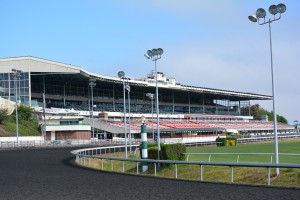 TBP: Is calling races on the Tapeta surface at Golden Gate different to normal dirt?
TBP: Is calling races on the Tapeta surface at Golden Gate different to normal dirt?
MW: Well when it rains, yes it is, because a horse can come from dead last through the field to win with completely clean silks, so from a completely selfish perspective I like it - it’s nice to be able to see the colors clearly! Winners also seem to come from all different positions in a race, you don’t get the kind of one dimensional speed bias that you often get on a dirt track.
TBP: Is there anything else that would make life easier for you as a race caller?
MW: I am very fortunate that I am doing what I always really wanted to do. One thing that I would enjoy though would be if owners of horses with tricky, strangely spelt names would get in touch with me so I could get the pronunciation right. I am not hard to get a hold of and I hate to get it wrong, so that would be very much appreciated!
McCann Bloodstock
http://mccannbloodstock.com/
